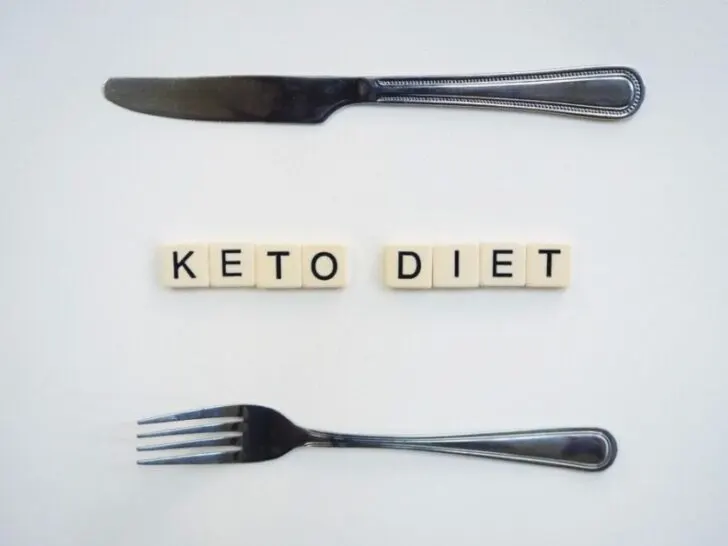Some of the links in this post are affiliate links. This means if you click on the link and purchase the item, we will receive an affiliate commission from the vendor at no extra cost to you. These business relationships allow us to keep bringing you great EatMoveHack content. All opinions remain our own.
If you’ve been paying attention to the world of dieting and nutrition in the last few years, you’ve probably seen or heard about the low-carbohydrate, ketogenic diet trend. It’s become popular, with multiple celebrities and authors advocating for the diet and the rapid weight loss that many have experienced. Is it more than just a low-carb diet? Does it mean that I have to eat all meat and no carbs? What is keto, and is it right for you? This guide will dive into the facts and misconceptions surrounding the ketogenic diet. It will help you decide if the keto journey is right for you and your lifestyle.
Understanding Ketosis
 When trying to understand the keto diet and how it could be an effective weight-loss tool for you, we should start by defining what the word “keto” actually means.
When trying to understand the keto diet and how it could be an effective weight-loss tool for you, we should start by defining what the word “keto” actually means.
Keto is short for ketosis. This is the term for when your body enters a new metabolic state. This state is one in which your body burns fat as its main source of fuel instead of carbohydrates. As your body converts the fat to fuel, ketone production begins. For your body to enter ketosis, you need to intake a severely reduced number of carbs to lower your glucose availability.
In a very exciting finding peer-reviewed article, evidence shows that nutritional ketosis has “the potential mechanisms of ketones for promoting weight loss, decreasing hunger, and increasing satiety. Humans have evolved with the capacity for metabolic flexibility and the ability to use ketones for fuel. During states of low dietary carbohydrate intake, insulin levels remain low and ketogenesis takes place. These conditions promote the breakdown of excess fat stores, sparing of lean muscle, and improvement in insulin sensitivity.”
Everyone’s body is different and the amount can vary slightly. Research shows that the average person enters ketosis after 3-4 days of ingesting less than 50mg of carbs per day.
What Does A Keto Diet Look Like?
The easiest way to think about the keto journey is that you will be making food choices based on a low-carbohydrate diet where you receive most of your daily calories from a good, high-fat diet. You still will want to balance these high-fat foods with a wide variety of colorful and leafy greens along with foods naturally high in fiber. Finally, you will want to ensure that you keep your water intake high as remaining hydrated is very important.
In a keto diet, ideally, you receive 70 percent of calories from fat, 20% from protein, and 10% from carbohydrates. If that seems like a lot of fat for a “diet” remember in ketosis your body uses fat as its primary fuel source as opposed to carbohydrates. So for this type of fuel, you need to significantly increase your intake in the same way you must reduce your carbohydrates.
This means bread and potatoes are mostly out, along with soda, chips, and a lot of the foods “traditional” diets discourage as well. You will be transitioning to a selection of keto-friendly foods that will help you accomplish your goals.
If you’re a meat-lover you may be happy to know the large majority of meats (assuming they haven’t been processed and a large amount of extra sugar hasn’t been added) are great on the keto diet (even bacon!).
Advantages Of The Ketogenic Diet
 Simplicity is the name of the game when it comes to keto. Because ketosis is a metabolic state, your body does a lot of the work for you. All you have to do is ensure your body maintains the necessary level of ketosis by limiting your carb intake. If you are able to do this then your body will start to burn body fat more efficiently.
Simplicity is the name of the game when it comes to keto. Because ketosis is a metabolic state, your body does a lot of the work for you. All you have to do is ensure your body maintains the necessary level of ketosis by limiting your carb intake. If you are able to do this then your body will start to burn body fat more efficiently.
This means that keto foods will lead to using fat for energy. This will positively impact your body composition and body weight. Ultimately, you will be using your fat stores as the body’s primary source of energy.
While this is the most obvious advantage of the diet, there are other tangible benefits to your health as well.
- During ketosis high-density lipoprotein (HDL), commonly known as “Good cholesterol,” increases, reducing the risk of heart disease and cardiovascular disease. People are often scared when cholesterol levels rise, but elevated ketone levels help with the cholesterol we want to be elevated.
- Appetite is heavily stimulated by carbohydrates, meaning on the keto diet you tend to be less hungry than on low-fat diets.
- The keto diet leads to both reduced blood sugar levels and reduced insulin levels. One of the major contributors to weight gain is the dreaded insulin resistance. A ketogenic diet can help keep your blood sugar levels under control and greatly reducing this risk.
- Increased fiber intake will enable the development of a helpful gut microbiome.
- With increased fat intake, you will often see an increase in protein intake as well. These elevated levels of protein are essential to the maintenance of a strong and robust body.
What Are The Risks Of The Ketogenic Diet?
While keto may seem like a revelation for a lot of dieters, it isn’t right for everyone. Since the diet is restrictive in comparison to most, it can lead to a certain level of social isolation since you may not be able to share some meals with loved ones.
In addition, because your eating habits might significantly change on the keto diet to the point you might become significantly preoccupied with your meals, you’re at a greater risk of disordered eating. Disordered eating is a blanket term used to describe irregular eating behaviors. These may be early signs of an eating disorder. While keto does require some dedication and thought, letting it take over your life can be harmful to your mental health (though this is true of all diets).
And lastly, keto isn’t appropriate for dieters who suffer from gallbladder, thyroid, liver, or pancreatic issues. While you should consult a doctor before embarking on any diet because keto involves fundamentally changing your body’s metabolic state which could have unintended effects depending on what conditions you may suffer from.
Conclusion
There are many aspects to the ketogenic diet you should examine before deciding if it’s right for you. Making sure you understand the physiological changes that occur in your body as well as understanding the risks involved with starting the diet are both important to ensuring your dieting journey is as safe and successful as possible.
Still, want to learn more about the keto diet? Here are some articles that can get you down the path:

